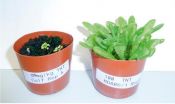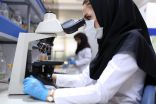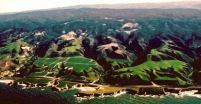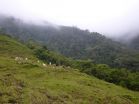Mutation protects plants against harmful explosive, TNT
2015-09-03
(Press-News.org) This news release is available in Japanese.
Researchers have identified a mutation in plants that allows them to break down TNT, an explosive that has become highly prevalent in soil in the last century, particularly at manufacturing waste sites, mines, and military conflict zones. TNT, or 2,4,6-trinitrotoluene, is a toxic and persistent environmental pollutant that accumulates in the roots of plants, inhibiting growth and development. The identification of a plant mechanism that not only evades the negative impacts of TNT, but breaks down this harmful substance could lead to improved revegetation and remediation of TNT-contaminated sites. By screening various plant lines of Arabidopsis thaliana for greater root growth in the presence of TNT, Emily Johnston and colleagues identified a mutation of the MDHAR6 gene, which allows these plants to have enhanced shoot and root biomass when grown in TNT-treated soil. The MDHAR6-mutant plants did not show tolerance to other harmful substances, indicating that the mutation is TNT-specific, and not related to a general boost in plant defenses. An analysis by the team revealed that there was no decrease in TNT concentration in the presence of the mutation; however, measuring electron activity revealed a one-electron reduction of TNT, an alteration that rendered the explosive less toxic to the plant. The authors note that this MDHAR6 reaction with TNT could also be leveraged to produce some types of environmentally acceptable herbicides. A Perspective by Graham Noctor explores additional surprising findings uncovered in this paper that raise new questions around the physiological role of MDHAR6 in plastids and mitochondria.
INFORMATION:
Article #10: "Monodehydroascorbate reductase mediates TNT toxicity in plants," by E.J. Johnston; E.L. Rylott; E. Beynon; A. Lorenz; V. Chechik; N.C. Bruce at University of York in York, UK.
ELSE PRESS RELEASES FROM THIS DATE:
2015-09-03
This news release is available in Japanese.
A special news edition, Science in Iran, looks closely at the scientific challenges and triumphs of a country that has faced international isolation in recent years. Following an exclusive interview about the Iran nuclear deal with Ali Akbar Salehi, president of the Atomic Energy Organization of Iran, Science International News Editor Richard Stone delves further into the state of Iran's scientific endeavors. Decades of economic sanctions have deprived Iranian scientists of critical scientific resources and collaboration. ...
2015-09-03
Biologists at the University of York have taken an important step in making it possible to clean millions of hectares of land contaminated by explosives.
A team from the Centre for Novel Agricultural Products (CNAP) in the University's Department of Biology has unravelled the mechanism of TNT toxicity in plants raising the possibility of a new approach to explosives remediation technology. TNT has become an extensive global pollutant over the last 100 years and there are mounting concerns over its toxicity to biological systems.
The study, which is published in Science, ...
2015-09-03
Researchers at VIB (a leading life sciences institute in Flanders, Belgium) and Ghent University have successfully established a causal relationship between exposure to so-called farm dust and protection against asthma and allergies. This breakthrough discovery is a major step forward towards the development of an asthma vaccine. The results of the research were published in the leading journal Science.
It is commonly known that drinking raw cow's milk can provide protection against allergies. A 14-member research team, led by professors Bart Lambrecht and Hamida Hammad ...
2015-09-03
Evidence from a new study published in PLOS Computational Biology by researchers from Brown University and led by Assistant Professor Thomas Serre suggests that when we analyze scenery we simply make the easiest judgments first, rather than following a priority order of categories.
There are many ways we understand scenery. Is it navigable or obstructed? Natural or man-made? A face or not a face? In previous experiments, researchers have found that some categorization tasks seem special, in that they occur earlier than others, leading to a hypothesis that the brain has ...
2015-09-03
Rodents huddle together when it is cold, they separate when it is warm, and at moderate temperatures they cycle between the warm center and the cold edges of the group. In a new study published in PLOS Computational Biology, Jonathan Glancy, Roderich Gross, Jim Stone and Stuart Wilson from the University of Sheffield found they could simulate huddling by assuming simply that touching individuals in turn brings their temperatures closer to an ideal body temperature. According to the model, these selfish individual behaviours improved the ability of the whole group to regulate ...
2015-09-03
Why aren't there more lions? That was what puzzled McGill PhD student Ian Hatton, when he started looking at the proportion of predators to prey across dozens of parks in East and Southern Africa. In this case, the answer had nothing to do with isolated human hunters. The parks were teeming with potentially tasty treats for the lions. So one might imagine that the population of lions in each park would increase to match the available prey. Instead, what Hatton and the McGill-led team discovered was that, in a very systematic way, in crowded settings, prey reproduced less ...
2015-09-03
CAMBRIDGE, Mass. (September 3, 2015) - A protein known to play a role in transporting the molecular contents of normal cells into and out of various intracellular compartments can also turn such cells cancerous by stimulating a key growth-control pathway.
By conducting a large-scale search for regulators of the signaling pathway known as PI3K/AKT, which promotes cell survival, growth, and proliferation--and which is highly active in cancer cells--researchers at Whitehead Institute and Memorial Sloan-Kettering Cancer Center have implicated the protein RAB35 in the oncogenic ...
2015-09-03
For millions of years, the Pacific and North American plates have been sliding past -- and crashing into -- one another. This ongoing conflict creates uplift, the geological phenomenon that formed mountains along the west coast.
A new analysis by UC Santa Barbara earth scientist Alex Simms demonstrates that the Pacific coastlines of North America are not uplifting as rapidly as previously thought. The results appear in the journal Geological Society of America Bulletin.
"Current models overestimate uplift rates by an average of 40 percent," said Simms, an associate ...
2015-09-03
Hurricane Jimena, a once powerful Category 4 storm with maximum sustained winds estimated at 140 mph by the National Hurricane Center, has continued to weaken well east of Hawaii. The Global Precipitation Measurement or GPM core satellite analyzed rainfall rates and saw the eyewall was eroding.
The eyewall of a hurricane contains a storm's most damaging winds and intense rainfall. It consists of a vertical wall of powerful thunderstorms circling a hurricane's open eye.
GPM is a joint mission between NASA and the Japanese space agency JAXA. GPM captured data on Jimena ...
2015-09-03
The world is facing an extinction crisis as more and more forests are converted into farmland. But does it help when farms share the land with birds and other animals?
The short answer is "no," according to new evidence based on the diversity of bird species reported in the Cell Press journal Current Biology on September 3. If the goal is to preserve more bird species, representing a greater span of evolutionary history, then it's better to farm more intensively in some areas while leaving more blocks of land entirely alone. In other words, land-sparing wins out over ...
LAST 30 PRESS RELEASES:
[Press-News.org] Mutation protects plants against harmful explosive, TNT







